Home » Uncategorized
Category Archives: Uncategorized
Holyoke Teachers Association: Building Union Power in 2025.
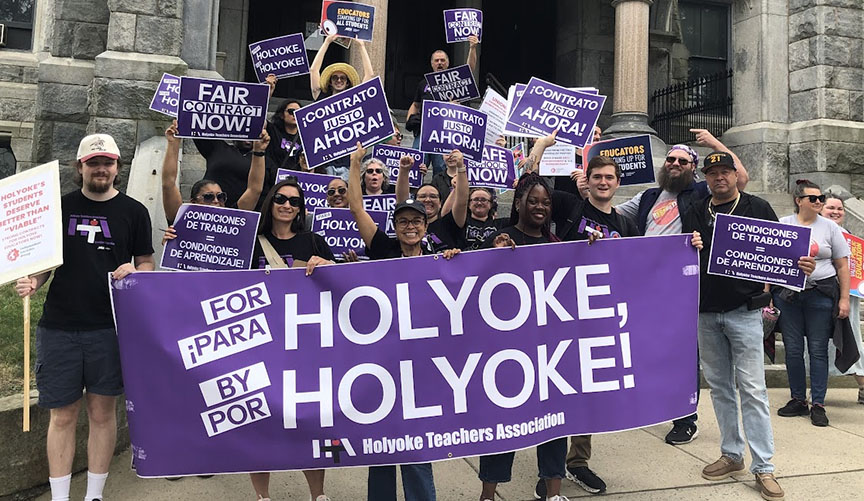
In 2025, our Building Action Teams (BAT) in every school have been doing the hard work of creating communication networks, updating members on ongoing actions and campaign news, and creating the types of democratic work places that we know we deserve. The BATs also helped build our bargaining platform, which included multiple 10-minute meetings at every school, feedback from hundreds of members, and work in small groups at an HTA general meeting.
BAT members organized a super majority petition with 95% of eligible unit members signing (0ver 600 people) and dropped this off to Mayor Joshua Garcia on September 8th. HTA members then spoke at the school committee meeting later that day, imploring elected officials to come back to the table and bargain in good faith. On October 8th, after having not heard back from the Mayor yet, around 35 HTA members surprised him at his annual bike ride, and told him that we are ready to bargain. A week later, the DLR replied to us with a strong message: go back to the bargaining table.
This is a substantial victory for the HTA, and was a direct result of our organizing and putting pressure on those in power.
-Nick Cream
MTA Passes Resolution on Defending the Vote
October 26, 2020
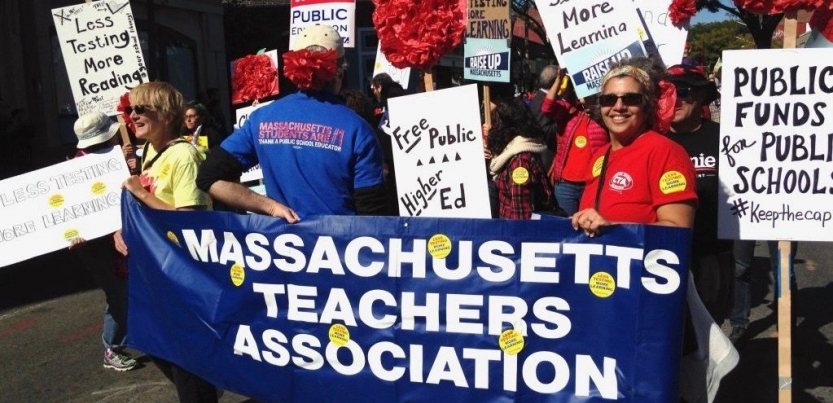
The MTA joined unions across the country when, at the October 17 MTA Board meeting, a resolution passed asserting MTA’s commitment to defending democracy and the vote. This loose grassroots network is preparing a strong labor response to any attempts to undermine the election.
It reads:
“Donald Trump and his enablers represent the most direct threat to American democracy since the McCarthy Era in the 1950s. If Donald Trump and his enablers attempt to obstruct, subvert, sabotage, overturn or reject a fair and complete count of presidential ballots (essentially a coup against democracy), or take any other steps to inhibit the peaceful transfer of power, organized labor and its allied labor organizations must respond with nonviolent action to defend the democratic process, the Constitution and an orderly transfer of power that is one of the historic hallmarks of American democracy. His presidency has been a disaster for the labor movement, the nation, and the world.
Therefore, be it resolved, that the MTA, in collaboration with other labor and progressive forces, will take whatever nonviolent actions are necessary to protect our democracy, the Constitution, the law, and our nation’s democratic traditions.”
EDU members can help to lead this effort by:
* Becoming part of national rallies to be held on Wednesday Nov. 5 asserting our commitment to democratic tradition. You join a rally or plan your own. Go to protecttheresults.com.
* Holding local union meetings to talk about what might happen and why a strong labor response will be necessary if efforts are made to undermine the election results.
* Be alert for updates and possible November 7 actions.
Interview: Student solidarity in higher education
Amanda Achin interviews Olivia Setzer, an undergraduate at Salem State University, about how students have been affected by the covid-19 crisis and how they are coming together to fight back.
What are some ways that you and other college students are being affected by the covid-19 crisis?
It’s no secret that almost everyone’s lives have been turned upside down by this pandemic. Focusing specifically on the college students’ experiences, I have heard mixed reviews about moving completely online. When it boils down to it, remote learning isn’t what students signed up for and their quality of education is being affected. The professors, in particular, have been outstandingly flexible and have gone out of their way to help students who are facing more than just motivation problems.
Out of the five people living in my apartment, I was the only one fortunate enough to qualify to get a stimulus check. Even if I put all $1,200 towards our rent, that wouldn’t even cover half of it. Luckily, I live with people who are financially frugal and have saved enough to cover rent for between three and six months or they are still working, but I realize that not every student is in the privileged situation that we are.
I have had three jobs at a time for the past year and still didn’t make enough to qualify for unemployment during the pandemic. My job eventually offered employees voluntary furlough and enough people took it so I still have hours. Financial hardships can be stressful enough for students. When you add on seeing our siblings, children, friends, and cousins missing important schooling milestones or hearing the constant fear in our grandparents’ voices, it takes even more of an emotional toll. Having this stress for an extended period of time is going to exacerbate the already-existing mental health crisis in the US.
How are students coming together in your school?
I’m part of the Honors Program Advisory Council (HPAC). On HPAC, we have organized Virtual Bagel Tuesdays where we all sit over Zoom, eat breakfast and talk about what has been going on in our lives. We’ve also done Virtual Game Nights to keep students connected with one another. We’re in the process of planning another Game Night and possibly doing a Virtual Movie Night where someone screenshares a movie of the groups’ choosing.
Students had been expressing their frustrations and concerns on multiple Salem State facebook pages. Initially, the biggest concerns were greater pass/fail options and reimbursements for tuition, dorms, and food plans. The pass/fail petition gained a lot of support from students and about 2900 students signed. Members of different student organizations started talking and brought together about 20 student organizations to sign on to a set of demands that were presented to the administration. A wide range of student groups signed on including Sunrise Movement Salem, Gender and Sexuality Alliance, Latin American Student Association, our campus radio station WMWM and even the SCUBA club.
The letter demanded that Salem State must
- switch to a pass/no pass policy
- reimburse students for unused meal plans, housing fees, and parking passes
- commit to an in-person Commencement ceremony for the Class of 2020
- advocate for and back federal and state proposals to provide immediate financial relief for students and public universities
All of these demands have either been met or are in the process of being met.
What do you hope we can achieve in this moment in the fight to defend public education?
During a time when social separation is key, students and faculty must come together to be a unified front during the fight to defend public education. We must all agree on a core set of ideals that benefit students, staff, and the public universities. Getting a large group to agree is hard enough as is, but when you have thousands of people’s futures in the balance, the stakes are raised even more, and emotions can run high. Unity is crucial for our success.
What are your concerns for the future of public higher education?
The future for higher education has been hanging in the balance for a while, but the coronavirus pandemic has just sped up the process. All you have to do is a simple Google search of “Mount Ida College” to see that private colleges and universities have been struggling for a while. The increasing rates of tuition and decreasing enrollment rates at public universities demonstrate that this issue isn’t just hitting private schools.
As I mentioned before, remote learning isn’t what students signed up for and the quality of their education is decreasing. When you pair students not getting what they paid for with a national and global financial crisis, odds are we are going to see a decrease in students choosing to get a degree and an increase of cost of tuition if something isn’t done to prevent it.
How do you think we should move towards winning a debt free future?
Salem State is the sum of all of its parts. Every student and faculty member contributes their little bit of excellence to the community. I am sure this is true at colleges and universities across the State. I don’t want to see my university lose pieces of excellence because they can’t afford to pay for school anymore or the school can’t afford to keep their position. Money shouldn’t be a factor in how excellent my school is.
Tying into the ideas of unity and the student action at Salem State, we should all come together to create a short, universal list of demands to be presented to all public colleges and universities across our Commonwealth. We need input from students, professors, teachers, maintenance workers, dining hall staff, library personnel, administrators, etc. all across Massachusetts for us to find a solution that works. If people from all public colleges and universities across the State are bombarding our representative with the exact same list of demands, written by us to benefit us, we are more likely to have our demands met. How we react now will determine whether or not we are one step closer to a debt free future. We must act quickly, cohesively, and decisively. The future of higher education is in our hands. Every second matters.
EDU Resolves to Turn Up the Heat in Fund Our Future Campaign
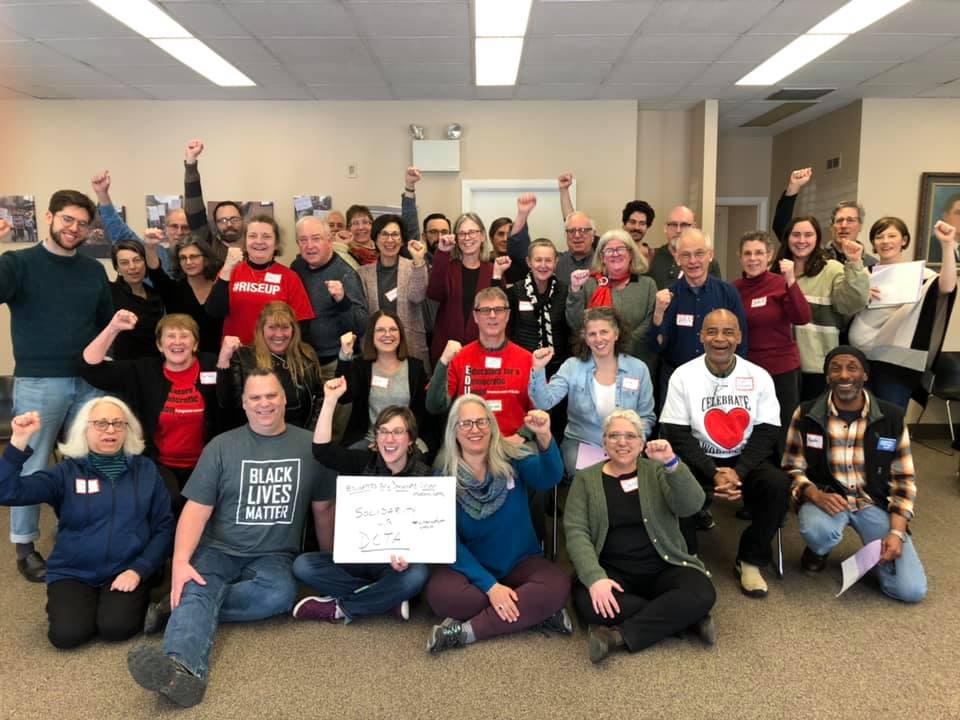
EDU held a well attended meeting on Saturday February 9. After hearing about the organizing in UTLA and in caucuses across the country, we discussed what it would look like for EDU to accelerate and intensify the Fund Our Future campaign. We voted overwhelmingly to:
1) Label the Fund Our Future campaign, in all EDU writing, Fund Our Future – No Strings Attached!
2) Task the EDU coordinating committee with developing a plan for civil disobedience if our demands for full funding with no strings attached are not met. 34 in attendance already indicated their willingness to engage in civil disobedience.
3) Initiate a petition campaign in buildings and locals wherein members will request a day off on May 1 in order to attend a rally for the Fund Our Future – No Strings Attached campaign. These petition campaigns will be organized by EDU members with the goal of collecting signatures from 50% of members in a building or local prior to bringing them to the principal, superintendent, or college president. The petition will say that these members are requesting a day off on May 1. If the administration refuses, we will have a strategy to address that.
We each also drew up an individual action plan for how we will organize a building site team, map our worksites, and develop escalating campaigns. The CC will be following up with attendees to support their plans.
If you did not attend the meeting, but want a petition and support developing an action plan, you can download the petitions below.
If you are interested in engaging in civil disobedience in order to win the campaign, please send an email to educatorsforademocraticunion@gmail.com.
We have a chance to bring the power of the #RedForEd movement to Massachusetts. Let’s lead the way!
EDU Members Nominate Merrie Najimy for MTA President, Max Page for Vice-President
In a great leap forward for union democracy, Educators for a Democratic Union voted on Saturday June 24, 2017 for Merrie Najimy and Max Page as our candidates for MTA president and vice-president respectively.
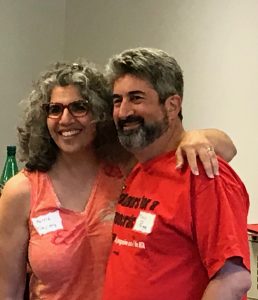
The vote came after three statewide forums in which eight candidates presented themselves for consideration. These candidates, Tim Dwyer, Kelly Henderson, Heidi Lahey, Deborah McCarthy, Jamie Rinaldi, and Jessica Wender-Shubow, along with the winning candidates, put their names forward pledging to support each other, grow EDU capacity, commit to strengthening the social justice union movement and to continue the transformation of the MTA that started under Barbara Madeloni’s leadership.
The selection process brought MTA members together at forums in Holyoke, Boston and Middleboro to hear from the eight candidates. All were welcome to come, listen and vote, after signing on to EDU’s principles. At the June 24th meeting, when final voting took place, time was made for EDU members to talk with each other about the candidates and the strategies for winning. This was a true collective effort and the energy, enthusiasm and pleasure in the process was evident in every conversation and the excitement about our choices.
Merrie Najimy, EDU candidate for MTA president, teaches kindergarten in Concord, is a founding member of EDU, and just completed six years on the MTA Board of Directors and eleven years as president of the Concord Teachers Association. Merrie is a leader in the MTA movement to rethink collective bargaining through member leadership and transparency. As a member of the Task Force on Race, she has led workshops on Islamophobia and racism. Read Merrie’s candidate statement to see her deep knowledge of and commitment to developing member leadership, and her vision of building a union that fights for public education and a more just world.
Max Page, EDU candidate for MTA vice president, is a professor of architecture at UMass Amherst, an MTA Board member and former executive committee member, was president of the Massachusetts Society of Professors from 2006-2008, and is a member of the Government Relations Committee. As a founding member of the Public Higher Education Network of Massachusetts (PHENOM) Max has been working for years to increase funding for public education Pre-K-16, sitting on the Raise Up Massachusetts steering committee and leading the MTA in the development of legislation that supports adjunct benefits, equitable pay, and the Finish Line grant as a step toward free public higher education. You can read about Max’s vision for the MTA as a leader in the fight for public education and social justice here.
EDU is excited to support two candidates whose ideas, experience, and practice will continue our work of transforming the MTA into an activist, social justice union. We are even more excited that we had eight such candidates, and that EDU membership is ready to pick up this work and move the MTA to be the visionary, fighting union we need.
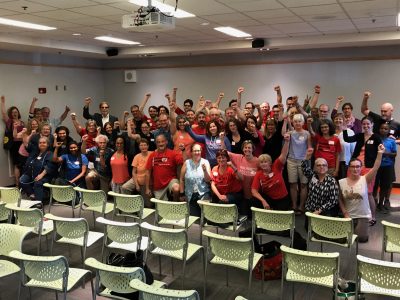
Statements From EDU’s Candidates For MTA President And Vice President
Who should EDU support for MTA president? For vice-president? We’d like to make that a democratic decision of the EDU membership, in an open and transparent process.
Download statements from EDU’s candidates for MTA president and vice president here. Then make your voice heard by voting at your regional candidate forum or at our next EDU meeting: Saturday, June 24, 12:30-3:30, at Watertown Public Library!
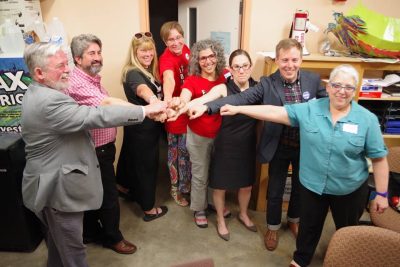
Brief: March Board Meeting
In our continued effort to transform the MTA into a democratically run, rank and file member driven organization, we will continue providing short reports on board meetings in the interest of transparency.
As will always be the case, our report does not intend to be comprehensive, just to hit some highlights. These are not official minutes or anything close to that.
EDU in the spotlight:
A discussion of EDU was scheduled as the first substantive item on the agenda, but was put off, and now is scheduled for the June meeting, but in practice EDU was the center of most of the New Business Items discussed at the meeting, and certainly the focus for the items that were most hotly debated and that took up the most time. We should note that numerous board members stated that the items presented were not directed at EDU, that they were simply abstract statements of policy, not at all concerned with EDU, they just happened to focus on caucuses, campaign slates, and so on.
Slates: The board debated at length whether or not slates would be permitted, although it was never clear what this meant. (Can one candidate endorse another? Does that make it a slate? Can multiple candidates all endorse the same set of principles, or would that make them a slate?) After considerable debate, the board voted this down; it was a decisive but relatively close vote.
T-shirts: The board debated whether members of some unspecified group can wear t-shirts at annual meeting, which violate MTA policy (no caucuses). After considerable debate this was decisively voted down.
Caucuses: A motion was made to prohibit the MTA from offering any support to any caucus. At first the policy seemed to be quite drastic, but as things were clarified in practice it became clear this meant MTA is not to provide a free room to a caucus (even if the room would otherwise be unused). This rule, of course, had nothing to do with EDU, but it was made clear that the policy does apply to EDU, but in the view of the makers of the motion it does not apply to the Retired Members Caucus or the Higher Education Caucus (each of which, by those names, receives a free room at the MTA annual meeting). In the end, it was clarified that if the policy does not prohibit EDU from receiving a room, but rather requires that EDU pay a modest fee for the room, and on that basis the motion passed, with some from EDU members supporting the motion.
Limiting what the president can do:
Another significant focus in the board meeting were efforts to limit the president’s power.
Organizing funds: One of these efforts concerned the Public Relations & Organizing Committee. Each year at annual meeting we vote an appropriation of $30 per member that goes into a separate fund, or about $2.7 million per year in total, controlled by the PR&O committee, whose members are appointed by the president. Before Barbara’s election the money was spent overwhelmingly to elect Democrats to state office, and for various donations (high school quiz shows, walks for cancer, etc.) to show that MTA cares. Since Barbara’s election, the PR&O money is spent primarily to support various kinds of organizing activity; related to that, but somewhat separate from it, most of the PR&O money from the last two years went to the No on 2 campaign.
The board had a motion to take control of this money away from the president and give it to the board. That would happen by removing the president’s power to appoint committee members, and giving that power to the board. (The president would have appointed 5 members, and the board would have elected 10 board members.)
This motion was ruled out of order; under the by-laws, committee members are appointed by the president, and the MTA’s General Counsel reported that to change the appointments to PR&O there would need to be a new by-law (which requires the support of two-thirds of the delegates to annual meeting); the board couldn’t just decide to do this.
Campaigns: The board passed a motion, whose exact meaning is unclear, that specifies that in order to undertake a campaign there must first be a vote supported by two-thirds of board members. The board meets only once every two months. If Mitchell Chester launches a new outrage (say, specifying that teacher license renewals will depend on student test scores), would a campaign need to wait two months until the board’s next meeting? Presumably there would be an emergency meeting, or a conference call, but even that would impose a significant delay. Does every request for members to send emails to legislators require a two-thirds board vote? This issue may well be contested in the future.
Complaint about election behavior and failure to respond:
Joan Richardson spoke on Saturday morning in the public comment period, to report that she attended the collective bargaining summit, and a candidate spoke from the podium and said that she was running for office and had nomination papers people could sign. Joan indicated that she had written to all the members of the Credentials and Ballots Committee to complain, and had not received a response.
The alleged violation, assuming it occurred, would be a minor violation, the kind of thing where you say to someone “You can’t do that. You can go up to people and collect their signatures, but if you are speaking officially you can’t campaign; the MTA as an organization needs to stay strictly neutral. So please don’t do that again.” And the person would say, “oops, sorry, I didn’t know, I won’t do it again.” So as a violation this was trivial, roughly the equivalent of someone at a meeting speaking on a yellow card but entering into debate.
If it is true that the Credentials and Ballots Committee was informed and did not respond, that’s a concern, and we need to know what happened. But it’s bizarre for the MTA board to debate this and condemn people, without having asked committee members what happened. Even though Barbara pointed out that the Board had no authority and no information upon which to act, and that she would be sure to proceed to find out what happened, some board members kept condemning people and demanding action. You had to be there to get a sense of the level of anger and hostility expressed by people, based on one person’s report, without having heard what members of the accused committee had to say for themselves. (Worth noting: This committee is a group of dedicated volunteer members, who are neutral in elections; as far as we know, none of the committee’s members belong to EDU.)
Budget deliberations:
Each year at the March board meeting the board discusses the budget, suggests revisions, and then votes on a budget to recommend to the delegates to Annual Meeting. The draft budget is drawn up by the Advisory Budget Committee, which is always chaired by the vice-president, currently Erik Champy. This year the debate on the budget was MUCH lengthier than usual. Many different board members were involved in proposing changes, or proposing modifications to the changes proposed by other members. Key decisions that were made on the budget to recommend – remember that Annual Meeting delegates make the final decision, the only decision that matters:
Reduce the PR&O budget: The board voted to reduce the separate dues for Public Relations and Organizing from $30 per member to $20 per member. This is money (see above) that the president has controlled, and that under Barbara has been used to fund a variety of organizing initiatives. The money saved will not reduce member dues, but will instead be put into reserves. Reserves can only be spent with board approval, so the effect of the motion is to reduce the money the president controls and to increase the money the board controls.
New member organizer: The board approved hiring an extra staff person to be a new member organizer; this motion was made by Laura Vago, not an EDU member.
Assorted minor maneuvers: A complicated proposal was made to reduce the allocation for a long list of items that historically have not spent as much as the budget proposed spending on them, and to move that money to contingency. As originally proposed this involved $972,000 but board members amended that in a variety of ways; after all the amendments, the amount involved was reduced to $381,000. In order to access this money in contingency requests will have to go to the executive committee.
Rally: The board, after considerable debate, supported holding a rally at 3:00 on May 20, with the aim being to end Annual Meeting by that time so that delegates can walk out and go to the rally, to be organized with a range of other groups, including the Massachusetts Education Justice Alliance.
Impending loss of agency fee:
Everyone in labor believes that next year the Supreme Court, with a 5 to 4 conservative majority, will vote that public sector unions no longer have a right to collect agency fees. Unions will still be required to provide a range of grievance and other services to non-members, but non-members will pay nothing. Zero.
Data was distributed showing the number of members and agency fee payers in each local. Most locals have very few agency fee payers. In higher education, there are much larger numbers; roughly half of adjunct faculty pay do not become members and pay the agency fee instead. ESPs are also especially likely to be agency fee payers. If agency fee is ended, we could lose anywhere between 4% and 20% or 25% of our revenue. (4% is the percent of those we represent currently paying agency fee, but many members might drop out if doing so didn’t just reduce their payments to the agency fee level, but instead reduced their payments to zero.)
The MTA commissioned an outside consulting group to look at our financial reserves. To make a very long story very short, we are in very good shape if things continue as they are, but if we lose a substantial fraction of our revenue, we would have to do something drastic to bring expenses and revenues into balance or else we’d run out of money in something like four years. The agency that studied our reserves recommended that we take time to make a reserves plan that fit with our long range plan and threat analysis. The Board will be dedicating its August meeting to developing strategies for addressing budget considerations going forward.
Bylaws, Resolutions, and the Standing Rules for Annual Meeting:
The proposals that will be brought to Annual Meeting are always discussed at the March board meeting. The board’s vote focuses on whether or not to recommend the items to the delegates. These notes are already too long, so very briefly some of the items that will be proposed are:
- To have ESP representatives to the board be elected only by the votes of ESP members (currently all members, both ESPs and teachers, vote on who should represent ESPs)
- That when the board or executive committee vote to go into Executive Session, there has to be a roll call vote, so members can tell how their board representative voted
- That at Annual Meeting, people speaking on a yellow card only get one minute (instead of three minutes)
The board supported some of these (and other) changes, and opposed some, but whatever the board vote, the issue will be decided by Annual Meeting delegates, so we aren’t focused on the exact breakdown of board votes.
Brief: February Board Meeting
by Dan Clawson
As part of our commitment to a member-driven union, EDU hopes to keep members informed about the inner workings of the MTA. The Board of Directors is a representative body, elected by members, and this brief is intended to share with the membership some highlights of the recent Board meeting, and all meetings going forward. As will always be the case, this report does not intend to be comprehensive; these are not official minutes or anything close to that.
Quick summary: The board is united in its opposition to the Trump regime, and its support for pushing back. A substantial segment of the board wants to attack EDU, although it is usually not willing to admit that is its purpose, and in one notable case the attack on EDU was combined with repeated claims that we need to all work together and to avoid partisanship.
Stoughton
There was an extended discussion of the swastika students put up in Stoughton, which led to the discipline of TEACHERS for their responses to the swastika. One teacher, who had written a letter of recommendation for the student who put up the swastika, and who rescinded her letter, has been given 20 days of unpaid leave (to be served two days a week for ten weeks), and two other teachers were given letters of reprimand. The teachers were disciplined because they are said to have discussed the incident in inappropriate ways with students. Apparently the Stoughton administration has decided that in Stoughton a swastika is not hate speech – although swastikas have been held to be hate speech in Amherst, in Concord, and in several other towns. The MTA board voted unanimously to send $1,000 to the teacher involved, and to send a strongly worded letter to any and all groups involved in this.
Trump attacks on labor
The assumption is that a Trump Supreme Court is certain to abolish agency fee, and may well launch a variety of other attacks (for example, ruling that unions cannot get employers to do dues checkoff). In the report of Ann Clarke, the Executive Director of the MTA, she noted that NEA projects losing 5-20% of total membership. That would thus reduce NEA incomes (and NEA provides some financial support to MTA, on the order of $3 million a year). The MTA might well have a similar loss of membership.
Members and local leaders should be talking about these issues. If we lost five percent of our members, or 20 percent of our members, and the associated revenue, what would the consequences be? We have many fixed costs we can’t get out of, at least in the short run. Would that mean we needed to cut staff costs by more than 5%, or more than 20%? Would we lay off staff? Cut everyone’s pay? Raise member dues? Dip into reserves (and if so, how long would it be before our reserves ran out)?
Reimbursement rate for retired member delegates
The board voted to raise the reimbursement rate for retiree delegates to Annual Meeting, from the existing level of $300 to a new level of $450. This was presented as needed because the rate had not been adjusted for eleven years, but (too late to enter the debate) I went on line and found that) the inflation adjustment would have only raised the rate to $369. It may be that costs for Boston hotels have risen more than general costs; that was asserted but no evidence was provided. The total cost of this is about $30,000.
Board refuses to cut its meetings to one day
The Executive Committee had recommended cutting the MTA budget by keeping board meetings to one day each. Traditionally board meetings have been held Friday evening and Saturday. Cutting meetings to just be on Saturday would save the costs of Friday night hotel rooms. An estimated $97,000 was at stake (thus about $1 per member in dues).
The board majority felt that (1) it is too onerous to ask board members to drive long distances, and to have a really long meeting, on Saturdays and (2) It is important that board members get to know each other; important social bonding takes place on Friday nights, and organizing happens in those social events. Ending those Friday nights would weaken the board, and thus the MTA. I voted to save the money and have one day meetings; I think just about all EDU members voted the same way. We should have asked for a roll call vote on this, but screwed up and failed to do so.
Executive Session
The Board went into Executive Session to consider a policy change in how to review the Executive Director. This discussion was about the policy, not about evaluating the current Executive Director (Ann Clarke – who actually is in the middle of being evaluated). A majority of the board apparently do not want members to know which members of the board supported what position on the best policy. Members are permitted to know what the old policy was, and what new policy was adopted, but it would apparently be a major problem for members to know the reasons for the new policy, or to know which board members supported changing the policy. (Trust me, nothing that interesting was said.) Any change in policy requires two readings, so the final discussion of the policy will take place at the March board meeting.
The proposed change in policy has several elements. Two minor elements are the election of the chair and the timing of the process. The most significant change is gathering new information by having board members interview staff (without the president or vice-president present) in order to get their views of the executive director.
I’m not sure how this will work in practice and how much difference it will make. To my mind the most interesting point was that a substantial majority of the board believed it to be important to discuss this in executive session, which means that members cannot know or be told what was said about the reasons for the change. I stress that the board did NOT discuss a personnel issue, that is a specific person, but only the POLICY that should be used to evaluate the Executive Director. For myself, I can’t for the life of me understand why we needed to be in Executive Session; I suspect that if we had discussed it in open session I would not have found it worth singling out for presentation in these notes, but the very fact that the board wanted executive session says something about the importance of the issue. I voted against Executive Session, and I believe all or almost all EDU members did so as well.
In addition there was a “regular” Executive Session on Saturday to deal with issues such as who should win awards, and approving the people selected as new managers and staff.
New Business Items
The board considered what might be a record number of New Business Items, covering a wide range of issues. Sometimes the issues that were most widely supported took the longest time to pass, because many people wanted to make minor wording changes. Many of the items put off to March are proposed changes in board policy, which must be considered at two meetings (unless the board votes to suspend the rules, which it can do); the legality of some of the NBIs was challenged, leading to postponement.
I will not attempt to present all the details of any of the items, but a quick take on some of the key items would be:
- MTA will defend our students, and our members, and will oppose any hate attacks on our students or members.
- MTA will support a march and rally on behalf of public education to be held around annual meeting.
- Changed board policies about how we select the committee to evaluate the Executive Director.
- Ask the NEA to rescind its “Friend of Education” award to Lamar Alexander, a senator who helped push Betsy DeVos’s nomination through
- Considered a policy to be sure that no caucus receives any resources from MTA. (It apparently applies to EDU, and seemingly it only, although the Higher Education Caucus and the Retired Members Caucus both hold meetings at Annual Meeting). This was not adopted, but will be considered again at the March MTA meeting.
- Considered, and put off to March, a motion to have the MTA Board, rather than the president, control the Public Relations & Organizing Committee. (Instead of the president appointing members, the president would appoint five people, and the board would elect ten board members.) This committee controls about $2.5 million a year, and thus is extremely important.
- Considered a motion to restrict the authority of the president to run a campaign, unless she gets two-thirds approval of the board of directors. Thus, for example, if the GIC raises costs to members, and the vote will take place in two weeks, the president could not ask members to send emails until and unless she received a two-thirds vote of the board. (Similarly for opposing Betsy DeVos, or a range of other issues.) Again, put off to the March board meeting.
- Considered a motion that would say board members, officers, and staff when speaking as representatives of the association shall make statements consistent with the adopted positions of the association. It’s not totally clear what this means, but it seems to mean people can’t speak out against board policy. Put off to March.
- Considered a motion that candidates must campaign as individuals, not as slates. Put off to March.
Co-sponsors of MTA legislation and budget
The MTA governmental staff have done a terrific job lining up legislators to sponsor the MTA’s main legislative agenda items. I think that is four bills.
Over 100 legislators are co-sponsoring the K-12 bill, and other bills have 80 or so co-sponsors.
The governor’s budget is not good, has small increases that may or may not keep up with inflation, but that definitely leave us below where we were in 2001 or 2002; for K-12 we are 5% below, for higher ed we are 25% below that peak funding period.
The End of Tuition
By Max Page & Dan Clawson
JUST A S surely as the sun rises on Provincetown and sets on Pittsfield, tuition and fees are again rising for students at public colleges and universities in Massachusetts. Students will work more hours, take on more debt, or drop out.
S surely as the sun rises on Provincetown and sets on Pittsfield, tuition and fees are again rising for students at public colleges and universities in Massachusetts. Students will work more hours, take on more debt, or drop out.
In the past decade, tuition and fees increased by thousands of dollars. This fall, they’ll jump by nearly 7.8 percent at the state universities and 5.8 percent at UMass.
Why? Because the story of the past 20 years has been a downward slope in public spending and an equivalent rise in tuition and fees. State appropriations for public higher education in Massachusetts are down 11 percent from spending levels in 2002, even though UMass, for example, now educates 30,000 more students. Tuition and fees have made up the difference.
Let’s jump off this annual merry-go-round of cuts, tuition hikes, and blame, and instead ask: Why are students paying tuition at all?
A large majority of the country now agree that some form of post-secondary education is essential to life success — not just a better-paying job, but the chance to fulfill one’s abilities and unique contribution. That conclusion is not confined to liberals. Margaret Spellings, secretary of education for George W. Bush, said,
“What a high school diploma was in the ’50s is akin, more and more, to at least two years of postsecondary education today.”
Until now. Free public higher education has gone mainstream. It’s not just that President Obama proposed free community college, or that Bernie Sanders made it a cornerstone of his campaign. Now Hillary Clinton, recognizing how crucial an issue this is to young voters, is going further than any previous party nominee: She has proposed making public colleges and universities free to students from families with incomes below $125,000 — that’s about 80 percent of all households.
It’s unlikely that Clinton will be able to enact her plan unless there are sweeping Democratic gains in Congress. But we don’t need to wait for Congress. Here in Massachusetts, a study by the Budget and Policy Center shows that free higher education at all public colleges and universities could be implemented at a cost of $631 million a year. If we applied a middle-income cap, or made only two years free, the cost would be a good bit less.
The money to do this could come in passage of the state Fair Share Amendment, which has the support of 70 percent of Massachusetts voters. By asking about 15,000 of the very wealthiest individuals to pay a bit more on their yearly income over $1 million, the state would generate close to $2 billion a year, far more than is needed to provide free public higher education to its residents, achieve a strong base for the knowledge economy, and a more educated democracy.
Max Page is a professor of architecture at UMass Amherst and a board member of PHENOM, the Public Higher Education Network of Massachusetts. Dan Clawson is a professor of sociology at UMass Amherst.
Story originally published in Boston Globe.
Weekly Update
![]()
There is power in numbers. Come join other educators, parents and social justice activists at the Save Our Schools March and National Call to Action on Friday, July 8, in Washington, D.C., and stay through July 9 for a conference at Howard University featuring a series of workshops. Rally speakers will include the Reverend William Barber, Jonathan Kozol, Diane Ravitch, Jitu Brown and other Dyett hunger strikers, Julian Vasquez Heilig, Denisha Jones, Gus Morales, Yohuru Williams and me.
Two buses will be leaving from Massachusetts on July 8, one from Boston and one from the New Bedford/Dartmouth area. They will return late on July 9. For just $30, a limited number of participants can get a seat on the bus, overnight accommodations and an event T-shirt.
Please e-mail UMass Dartmouth Professor Ricardo Rosa at ricardorosa1973@yahoo.com by June 27 to reserve your seat. Go HERE for more information.
GET A FREE COPY OF ORGANIZING HANDBOOK
The MTA is making copies of “Secrets of a Successful Organizer” available for free to members who are interested in reading and discussing it with colleagues over the summer. The book shows you how to fight back where you work – and win. It’s a step-by-step guide to building power on the job. For a copy of the book, published by Labor Notes, contact Ari Mercado at amercado@massteacher.org.
EDU plans to read this book in its summer and fall organizing efforts; every caucus member should have a copy!



